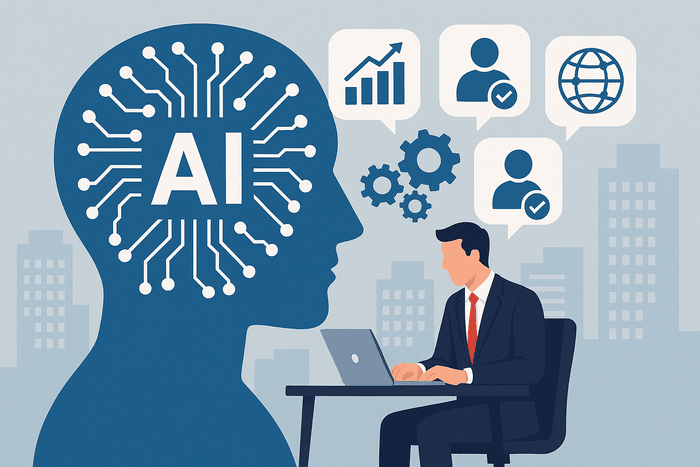
Artificial Intelligence (AI) has transitioned from a niche technological innovation to an essential component of contemporary business strategies. Its rapid development and adoption are redefining how enterprises operate, innovate, and compete in an increasingly digital economy. From automating mundane tasks to enabling complex decision-making processes, AI’s influence is pervasive across industries and organizational functions.
This comprehensive research explains the multifaceted impact of AI on modern-day businesses, examining benefits, challenges, ethical concerns, and the way forward. As AI is going to persist in its evolution, its effects are of significance to leaders who are eager to harness its advantages towards sustainable development and competitiveness.
Automating business operations for enhanced efficiency
Among the most immediate impacts of AI is the automation of routine, repetitive tasks that were done with human intervention before. Robotic Process Automation (RPA) uses AI algorithms to automate data entry, invoice processing, customer service inquiries, and supply chain management. Automation of these tasks reduces operational costs, minimizes errors, and accelerates workflows.
For instance, many banks employ AI-powered chatbots to handle customer queries around the clock, freeing customer service representatives to focus on more complex issues. Similarly, manufacturing companies use AI-driven robots to assemble products with precision and speed, enhancing productivity and safety.
Automation also extends to back-office functions like payroll, compliance verification, and reporting, which allows organizations to reallocate human resources to strategic initiatives. Through the maturity of AI-driven automation, companies can realize significant cost savings and operational efficiencies.
Data-driven decision-making and predictive analytics
Modern enterprises generate and collect huge volumes of data on a daily basis. Making sense of the data is a challenge as well as an opportunity. AI-powered analytics tools process large datasets at high velocities, identify patterns, and extract valuable insights that inform decision-making.
Machine Learning (ML) algorithms examine customer actions, sales patterns, and market trends, allowing organizations to forecast future demands and streamline strategies. For instance, retailers study purchase history and browsing patterns to tailor marketing campaigns, which boosts conversion rates.
Financial institutions use AI algorithms to forecast stock prices and determine credit risk more precisely than conventional methods. Healthcare institutions use AI for diagnostic imaging and forecasting patient outcomes, which enhances the efficacy of treatment.
By using AI-driven analytics, companies can reduce uncertainty, make better resource allocations, and respond more quickly to market changes—a vital advantage in today’s volatile environment.
Creating a superior customer experience through personalization
Customers’ expectations have shifted, demanding personalized, seamless experiences across channels. AI enables companies to deliver by analyzing individual preferences, behavior, and feedback in real time.
E-commerce giants like Amazon and Netflix utilize AI algorithms to recommend products and content tailored to each user, boosting engagement and loyalty. Chatbots and virtual assistants provide instant, round-the-clock support, resolving issues efficiently and freeing human agents for complex interactions.
AI-driven personalization extends beyond marketing; it influences product design, pricing strategies, and after-sales services. For example, AI can dynamically adjust prices based on demand and customer profiles, maximizing revenue.
By delivering personalized experiences, companies form more meaningful customer relationships, strengthen loyalty, and differentiate in competitive markets.
Accelerating innovation and product development
AI is an accelerator of innovation, leading to faster development cycles and smarter products. AI facilitates simulation, prototyping, and testing, reducing time-to-market.
In healthcare, AI-powered diagnostics and drug discovery accelerate the development of new treatments. In automotive, AI powers the development of autonomous vehicles, transforming how people travel.
Manufacturers leverage AI to optimize design processes with generative design algorithms that produce new structures within specified constraints. Financial services utilize AI for algorithmic trading and risk management, generating new investment strategies.
AI-derived insights allow companies to better anticipate customer needs and market trends, leading to continuous innovation that sustains competitive advantage.
Optimizing supplu chain and operations
Supply chains are complex with numerous stakeholders, logistics, and variables. AI enhances supply chain management through demand forecasting, inventory optimization, and route optimization.
Predictive analytics enable companies to anticipate demand shifts, preventing stockouts or overstocking. Autonomous trucks and drones, made possible through AI, are beginning to revolutionize last-mile delivery, reducing delivery times and costs.
Additionally, AI optimizes warehouse management through automation and real-time tracking, thereby increasing efficiency and accuracy. For example, Amazon’s use of AI-powered robots in fulfillment centers significantly increases throughput.
Streamlined supply chain management with AI not only reduces costs but also increases agility, allowing companies to respond swiftly to disruptions like geopolitical conflicts or global crises.
Workforce transformation and talent management
AI integration in businesses influences workforce dynamics profoundly. As automation takes over some of the manual tasks, it also demands new skills, including data science, AI development, and strategic management.
Businesses are investing in upskilling and reskilling programs to make workers ready for AI-centric ecosystems. For instance, digital literacy training and AI tool training help keep employees relevant and productive.
Additionally, AI facilitates talent acquisition through resume analysis, candidate suitability analysis, and minimization of hiring biases. HR analytics enable the optimization of employee retention and engagement initiatives.
Nevertheless, the implementation of AI poses ethical questions about job displacement and fairness in the workplace. Leaders need to navigate this shift openly, weighing technological progress against social responsibility.
Ethical challenges and resposible AI adoption
The extensive use of AI raises significant ethical issues. Data privacy is the most vital, with regulations like GDPR requiring organizations to maintain the privacy of user data.
Bias and discrimination within AI models pose risks of unfair treatment, damaging brand reputation and prompting legal repercussions. For example, biased hiring algorithms can unintentionally favor particular demographic groups.
Transparency and interpretability are essential; stakeholders must understand how AI systems arrive at decisions. “Black-box” unintelligible models can damage trust.
Businesses must establish governance frameworks for responsible AI use, including ethical guidelines, audit practices, and stakeholder engagement. Trust has to be established through transparency and accountability if long-term integration of AI is to succeed.
Competitive advantage and market disruption
AI can be a game-changer, providing companies with a significant competitive edge. Early adopters can innovate faster, be more efficient, and provide enhanced customer experiences.
Slower-moving companies, however, risk becoming irrelevant as others leverage these technologies to disrupt traditional markets. Ride-sharing startups Uber and Lyft, for example, leveraged AI to revolutionize transportation, posing a threat to traditional taxi services.
Large technology firms like Google, Amazon, and Microsoft are pouring money into AI research, continuously pushing industry boundaries. Smaller firms that adopt AI solutions early can also discover niche markets and expand quickly.
Essentially, AI is both an innovation enabler and a disruptor of existing business models, revolutionizing entire industries.
Future trends and emerging opportunities
The future of AI in business looks promising, with several emerging trends poised to transform the landscape even more:
- Explainable AI (XAI): Developing interpretable models that provide evident reason for decisions, making trust and compliance with regulations possible.
- Edge Computing: Processing data on the device itself (e.g., IoT sensors) to reduce latency and bandwidth requirements.
- AI as a Service (AIaaS): Cloud-based AI platforms make the access democratized, allowing smaller enterprises to leverage high-level AI without significant infrastructure investments.
- Integration with Internet of Things (IoT): AI coupled with IoT devices ushers in smarter environments, from predictive maintenance in factories to smart cities.
- Human-AI Collaboration: Future systems will focus on enhancing human intelligence rather than replacing it and will foster symbiotic human-machine relations.
These innovations will embed AI more into the enterprise core activities, unlocking new efficiencies, innovations, and business models.
Conclusion
The influence of AI on contemporary businesses is deep and far-reaching. Its potential to automate, analyze, personalize, and innovate is revolutionizing all dimensions of business activities. Businesses that embrace AI in a strategic manner—weighing technological possibilities against moral obligations—will set themselves up for sustainable success.
Yet embracing AI requires an all-encompassing strategy: investing in talent and infrastructure, establishing governance and ethical frameworks, and building an organizational culture receptive to change. Leaders must envision AI not merely as a tool but as a strategic partner on their journey toward digital transformation.
Ultimately, AI is a catalyst for a new era of business—one characterized by heightened efficiency, innovation, and competitive resilience. The organizations that responsibly unleash its potential will shape the future of commerce and industry.
